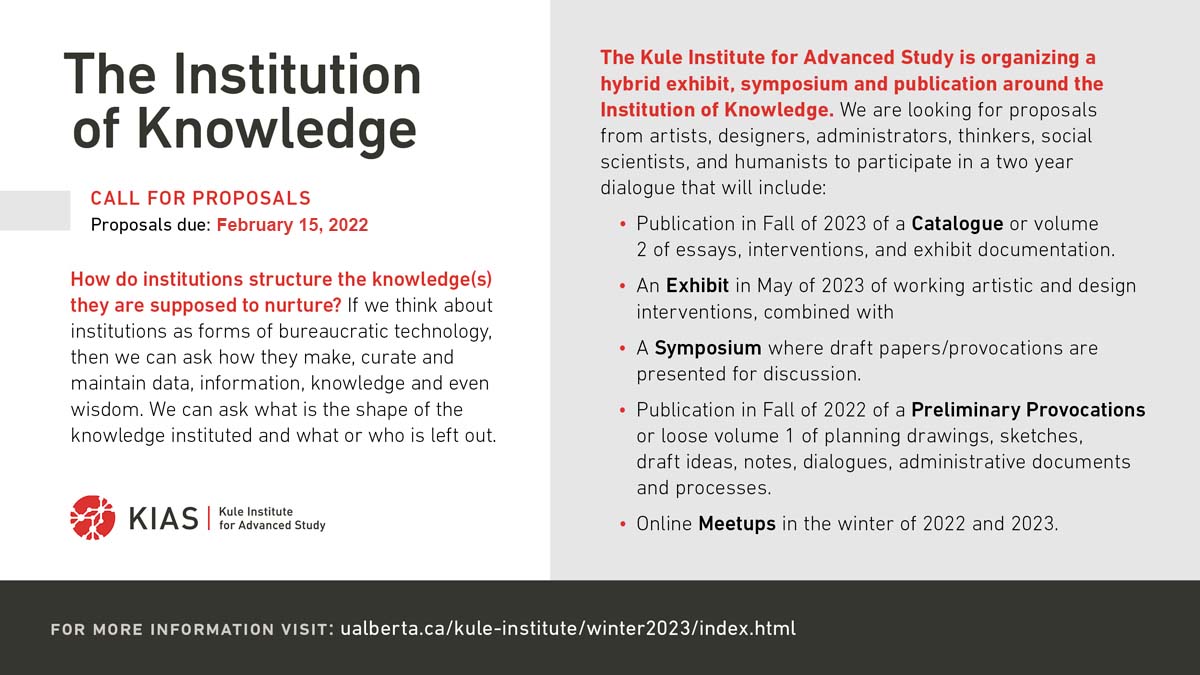Call for Proposals
Call for Proposals
Proposals Deadline Extended Until February 15, 2022
Please feel free to download the image below for sharing with networks over social media.

How do institutions structure the knowledge(s) they are supposed to nurture? If we think about institutions as forms of bureaucratic technology, then we can ask how they make, curate and maintain data, information, knowledge and even wisdom. We can ask what is the shape of the knowledge instituted and what or who is left out.
The Kule Institute for Advanced Study is organizing a hybrid exhibit, symposium and publication around the Institution of Knowledge. We are looking for proposals from artists, designers, administrators, thinkers, social scientists, and humanists to participate in a two year dialogue that will include:
- Publication in Fall of 2023 of a Catalogue or volume 2 of essays, interventions, and exhibit documentation.
- An Exhibit in May of 2023 of working artistic and design interventions, combined with
- A Symposium where draft papers/provocations are presented for discussion.
- Publication in Fall of 2022 of a Preliminary Provocations or loose volume 1 of planning drawings, sketches, draft ideas, notes, dialogues, administrative documents and processes.
- Online Meetups in the winter of 2022 and 2023.
Prospective participants should be prepared to collaborate in the major phases of this research-creation dialogue including contributing sketches or informal essays for the Preliminary Provocations, participating in the Exhibit/Symposium and finally preparing finished work for the Catalogue. The Preliminary Provocations will form the basis of online meetups across disciplines and practices leading to the Exhibit/Symposium which in turn will lead to the design of the final Catalogue.
Proposals that play with institutional forms, boundaries, practices and bureaucratic documentation are welcome. We particularly encourage proposals from those who are marginalized or constrained by academic institutions. Who gets to inhabit the institution, and how? Who is forced to ask questions of the institution, and when? Who is disciplined when they do, and why? Proposals could aim at a paper or other form of document suitable for discussion in the Symposium and publication in the Catalogue. Alternatively proposals could aim at Exhibition with documentation in the Catalogue.
Proposals should be submitted by email to kias@ualberta.ca . Proposals should include contact details, short biography, description of the imagined contribution, budget or discussion of resources needed, and discussion of any constraints to participation we should take into account.
The Institution of Knowledge
Asking about the institution of knowledge is important in a university like the University of Alberta that prides itself on teaching and generating new knowledge. The university is, however, but one type of knowledge institution. Within the university we have departments, faculties, colleges, centres, labs, libraries, and yes, institutes. Students and staff also contribute to other cross-cutting institutions like projects, journals, societies, or advisory boards. These different types of institutions have their histories, missions, tacit and explicit knowledge processes. “Institute” is both a verb and a noun. Institutions are both instituted or set up with particular forms of knowledge in mind, and they then institutionalize that knowledge. In this project we want to tease open these different senses of institution during this time when many institutions are being restructured or are in crisis. Let us rediscover the opportunities for setting up our institutions and reflect back on existing ones like the Kule Institute for Advanced Study.
The motto of the University of Alberta, Quaecumque vera is from a longer passage in Philippians 4:8 that calls us to think upon “whatsoever things are true”,
"Finally, brethren, whatsoever things are true, whatsoever things are honest, whatsoever things are just, whatsoever things are pure, whatsoever things are lovely, whatsoever things are of good report; if there be any virtue, and if there be any praise, think on these things." (Philippians 4:8, King James Version)
Is that what institutions do? Do they focus the thinking of particular people on particular types of things? If so, is the design of our institutions a choosing of who and what to think about? Can we think ethically about these choices? Do we need to go beyond usual honesty and imagine different institutionalizations?
The Institution of Knowledge is itself an experiment in research-creation practice. As such we are open to different forms of knowledge including collaborative forms, dialogues, satires, cabinets, pigeonholes, committees, boards, bylaws, constitutions and so on. Proposals should feel free to not just reflect on the institution, but to play with it.
Subtopics
Proposals should consider the following subtopics, but not be limited to them:
- Births and Principles of Institutions
- Representations of Knowledge in the Institution
- Knowledge Things: What sort of thing is an institution?
- Restructuring Knowledge for the 21st Century
- The Limits of Interdisciplinarity and Collaboration in the Institution
- The Metrical Gaze of the Institution
- The Preservation Institutions of Knowledge
- The Ends of Academic Institutions
Contact Information
For more information contact us at kias@ualberta.ca
|
Geoffrey Rockwell Casey Germain |
|
|
Natalie Loveless |
|
|
Sue Colberg |
|